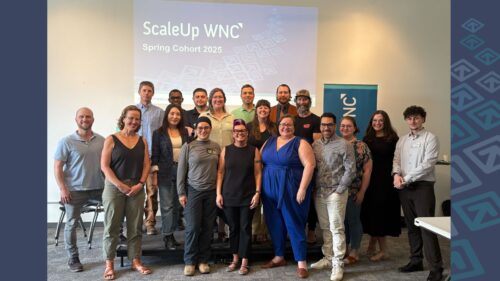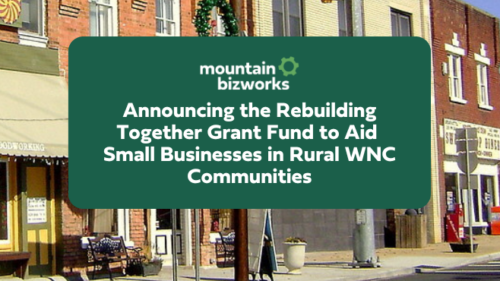New report identifies opportunities and challenges for improving the profitability and sustainability of WNC local food farms
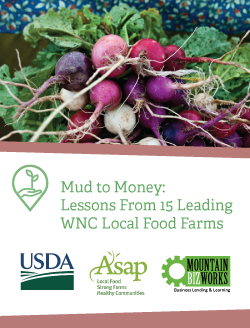 (Asheville, NC): Over the last decade, Asheville and the greater Western North Carolina region have made significant strides towards building a robust local food economy. Annual sales under the Appalachian Grown local foods brand alone top $200 million. The Asheville area is also one of only a few areas in the country that experienced an increase in the number of new farms in the most recent agricultural census (USDA 2012).
(Asheville, NC): Over the last decade, Asheville and the greater Western North Carolina region have made significant strides towards building a robust local food economy. Annual sales under the Appalachian Grown local foods brand alone top $200 million. The Asheville area is also one of only a few areas in the country that experienced an increase in the number of new farms in the most recent agricultural census (USDA 2012).
While these are strong advances for WNC small family farms, it is also clear that some farms still struggle with attaining financial sustainability and success. To help address this, the Appalachian Sustainable Agriculture Project (ASAP) and Mountain BizWorks have joined in a multi-year effort to provide high-quality business coaching and training to beginning and established local food farms.
Along with a consultant, Emergent Opportunities, Inc., Mountain BizWorks conducted this benchmarking study to better understand the current state of financial and business management practices and performance for area farms serving local foods markets. As one farmer succinctly put it, “Financial data determines what to grow, who to sell to, and at what price.”
The study focused on identifying best practices, key pieces of advice, and core concerns from established and relatively successful farmers, so that study results could be used in training earlier-stage farmers, and to identify areas of need or opportunity to help further the success of already-established farms. Data collection for the study consisted of a series of lengthy and detailed interviews with 15 established farmers from across WNC (described below).
In addition to publishing the report, Mountain BizWorks and ASAP will be incorporating the tools and strategies identified into trainings at the Business of Farming Conference, stand-alone workshops, and into Mountain BizWorks’ one-on-one farm business coaching services. Visit mountainbizworks.org/farm to learn more about upcoming trainings.
The Study Cohort: 15 Established Vegetable Farmers
Researchers limited the farm cohort for this study to only farms that primarily grow vegetables for local markets. After much discussion, it was decided that orchards, dairies, value-added products, or animal operations had substantially different needs and financial systems, and that a focus on just one type of farm was the wisest course for this limited study. In the future, we hope to expand this research to cover other prominent farm types in the region.
Fifteen established produce farmers participated in the study. These farms collectively account for over 3,000 acres in production (ranging from 2 acres to over 1,000). The farms hail from across Western North Carolina including from the High Country, Foothills, Asheville metro, and Southwestern communities. These farms represented 223 years of cumulative farming experience with a median of 15.5 years in farming. Annual revenues for the farms studied ranged from under $100k to over $1m. Total annual revenue for the study group was $3.6m in 2016 (median: $164k).
Animals Are a Common Part of Diverse Mountain Farms
While we focused specifically on vegetable producers, five farmers we interviewed did have livestock incorporated into their enterprise, while another farmer amended their soil with aged manure from a family livestock operation. These farmers noted that livestock provided them with a valuable source of soil nutrients, and were important to farm diversity in terms of income and risk management as well as maximizing utilization of lands that are hard to grow row crops on.
Mud to Money Benchmarking Study Report Sections & Structure
This benchmarking study report consists of five chapters, each of which is also designed to function on its own as a “mini-report” that is easy to read and distribute on its own. Brief overviews of each chapter, including links to those chapters, follow below.
 1. Farm Goals
1. Farm Goals
Farm Goals compiles and categorizes farmers’ responses to the questions, “What are your financial goals for your farm? Are there any other goals you have for your farm?”
2. Financials Part I: Systems and Tools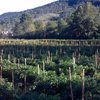
Farmers in Western North Carolina (WNC) use a variety of tools and approaches to manage and track their finances and farm records, this chapter covers some of the core tools that farmers are using to effectively collect and analyze data from their farms, as well as new technologies that farmers are currently experimenting with.
3. Financials Part II: Approaches and Lessons Learned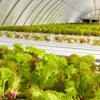
This chapter dives into how farmers use gathered data, and broader decision-making frameworks, to make strategic decisions about their farm. The first part of this chapter contains eight specific systems examples of data-based decision-making, while the second part covers broader philosophical and strategic considerations farmers take into account in decisions making to ensure long-term sustainability and success for their farms.
4. Farm Labor
Labor is the single largest cost, and source of ongoing concern, for most every farmer interviewed. All but one of the farms interviewed expressed considerable alarm to the difficulty of finding, recruiting, and retaining reliable farm laborers, from apprentices to H2A workers and everything in between. Within the chapter Specific concerns, research opportunities, and ideas for how to address them are covered.
5. Advice for the Next Generation
In aggregate, the farmers interviewed had 223 years of hard-won farming experience, and multitudes of learnings to pass on. This chapter highlights specific lessons the farmers hoped to share with the next generation of farmers, ranging from highly practical information around cash flow, finances, and marketing, to philosophical musings on working within the community, discovering passions, and the value of being a lifelong learner.
Download the full report here.
